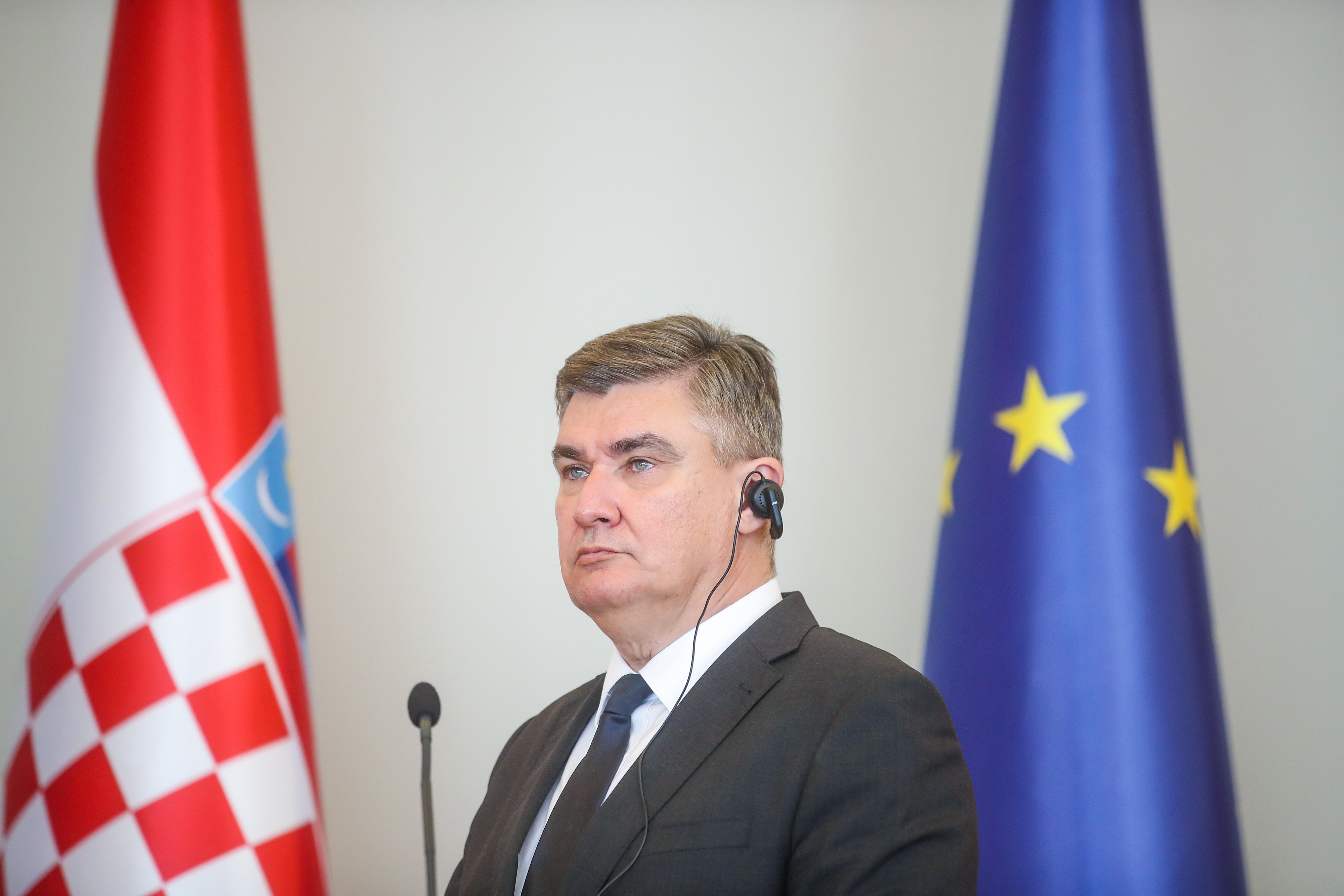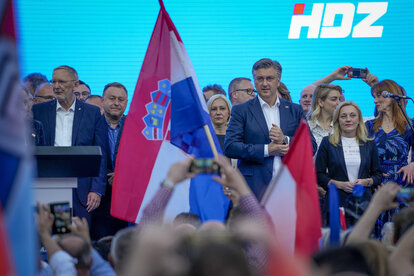Parliamentary elections in Croatia
King Kong vs. Godzilla – the Croatian way

The Croatian President Zoran Milanović
© picture alliance / PIXSELL | Slavko MidzorIn mid-March, the Croatian parliament, the Sabor, dissolved itself to clear the way for elections. Just one day later, the slightly eccentric President Zoran Milanović put a spoke in the wheel of the country’s political establishment.
First, the president, who makes no secret of his populism, scheduled the parliamentary elections for Wednesday, April 17, and immediately declared the day a public holiday so that all Croatian citizens could vote regardless of their professional obligations. However, a significant number of Croats live in neighbouring Bosnia and Herzegovina and traditionally tend to be close to the conservative-nationalist “Hrvatska demokratska zajednica” (HDZ, “Croatian Democratic Union”). Those Croats, in turn, could find it difficult to cast their vote due to the unconventional election date on a weekday. President Milanović also made it unmistakably clear that he had chosen this manoeuvre in order to “break the supremacy of the HDZ”.
The initial situation: two alpha males among themselves
The second coup came the same afternoon, when the president, constitutionally committed to political independence, appeared at a press conference of the oppositional “Socijaldemokratska partija Hrvatske” (SDP, “Social Democratic Party of Croatia”) and, standing next to party leader Pedja Grbin, announced his own candidacy for the post of prime minister. This immediately turned the parliamentary election into a stage on which two Croatian power politicians, Zoran Milanović and incumbent Prime Minister Andrej Plenković, square off against each other.

Prime Minister Andrej Plenković, centre right, takes part in a rally of his party in Zagreb, Croatia.
© picture alliance / ASSOCIATED PRESS | Darko BandicAccording to rumours, the rivalry between the two goes back over thirty years, when both joined the newly established diplomatic service after Croatian independence at the same time. In 2016, Milanović, who was prime minister himself from 2011 to 2015, lost an election victory he thought was certain against Andrej Plenković, who was only a moderately well-known MEP at the time and has been prime minister ever since.
One of the main issues is the susceptibility to corruption of the HDZ, which has been in power for almost ten years. Since Plenković took office as prime minister, around 30 ministers have already had to resign from their posts, often due to corruption. Plenković, although still with a “spotless vest”, also recently made two blunders: firstly, a judge with proven links to the criminal milieu was elected Attorney General with votes from the HDZ. Shortly afterwards, Plenković started a public dispute with the EU public prosecutor’s office, whose authority on the misappropriation of EU funds in Croatia he questioned.
In the first days of the election campaign, Milanović’s plan to run an “anti-HDZ campaign” even worked: his harsh, often vulgar and insulting accusations of corruption against Plenković’s government gave the SDP a boost in popularity. However, just three days after the election date was announced by Milanović, the Croatian Constitutional Court declared the President’s intention to stand for election as prime minister to be unconstitutional. As President, he had to be non-partisan and therefore could not perform any function in an election campaign – even a mere participation in the campaign was incompatible with the constitution.
As a result, Milanović – who stubbornly refused to step down as president in order to run as a candidate for prime minister – himself became the main negative topic of the election campaign. His plans to establish a “government of national salvation” as a nominal social democrat with far-right parties also met with awkward silence in the SDP-led opposition coalition. Milanović’s popularity ratings plummeted.
The possible scenarios
According to the latest polls, the national conservative HDZ could win around sixty of the 151 parliamentary seats, while the coalition led by the social democratic SDP would win around 45 seats. In addition, there are three very different parties who could tip the scales: the right-wing populist “Most” (“Bridge”), the green party “Možemo!” (“We can do it!”) and the xenophobic “Domovinski pokret” (“Homeland Movement”). All of them have around ten seats in the polls. All three parties are united by great animosity towards the HDZ, albeit from completely different ideological directions. This results in three potential election outcomes:
1. The opposition coalition under Milanović’s clandestine leadership does not achieve an absolute majority, but is ahead of the ruling HDZ. In this case, both the Greens and the right-wing “Most” and “Domovinski pokret” would be prepared to support a minority government led by Milanović. This would be a highly unstable solution with a single common goal: to dismantle the HDZ structures and networks within the Croatian administration that have been built up over decades and to eradicate the corruption associated with it. The foreign policy orientation of this alliance of convenience would be questionable from a European perspective and could lead to a “Croatia First!” policy by Milanović, which could torpedo EU policy in the Western Balkans in particular.
2. The ruling HDZ becomes the strongest party and manages to win a majority of 76 seats or more with the help of the votes of the national minorities, Croats abroad and smaller parties. A new Plenković government, also under European pressure, will have to devote more attention to fighting corruption than before. If Plenković, who is not very popular with the right wing of the HDZ, throws in the towel, the HDZ government is likely to shift to the right. In this case, Plenković could either seek a high EU position or run for president against Milanović in December.
3. Neither Plenković nor Milanović manage to form a government within sixty days, which would lead to new elections in midsummer. With a much lower voter turnout expected, the HDZ should be considered the favourite in this case.
And the liberals?
Unfortunately, Croatia’s various liberal parties are also competing in different camps in this election: the Istrian regional party IDS, together with a liberal party called “Focus”, has formed its own small liberal pre-election coalition with other centrist parties, which is hoping for four to six seats. The “Centar” party, which is particularly strong in Dalmatia, hopes to gain three seats as part of the SDP-led “anti-HDZ coalition”. The liberal-conservative “Hrvatska socijalno-liberalna stranka” (HSLS, “Croatian Social-Liberal Party”), on the other hand, agreed to form a coalition with the HDZ, as it did in 2016 and 2020, and will win one or two seats as a result. It is to be feared that none of the liberal parties will be able to raise their profile as a result.
Conclusion
The decision between two alpha males – and not the debate on substantive issues - could determine the outcome not only of these parliamentary elections, but also of the European elections in June and the presidential election in December. If the ongoing insults between Milanović and Plenković’s ministerial team tire voters and push voter turnout to an even lower level than the 46.9% in the last election in 2020, this would be a bad omen for Croatian democracy.
It would be considered a success if the still young Croatian democracy were to survive its teething troubles – in the form of a highly polarized campaign and an errant president who does not respect the constitution – relatively unscathed. This would not only secure Croatia’s future as an at least reasonably stable EU member state, but also lay the foundations for a more productive role for the country in the EU accession negotiations of other Western Balkan states.
Dušan Dinić is Senior Manager for Croatia & Serbia at the Belgrade office of the Friedrich Naumann Foundation for Freedom.
